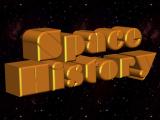If you are not already a subscriber, you are welcome to enter your email address here to sign up to receive the Space History newsletter on a daily basis. Under no circumstances will we release your legitimate email address entered here to outside persons or organizations, and it will only be used for mailing the specific information you have requested.
| Enter your email address here: |
Unsubscribe instructions are included in every newsletter issue in case you decide you no longer wish to receive it.
Note: We record the IP address from which subscriptions are entered to help prevent SPAM abuses.
Race To Space
Someone will win the prize...
... but at what cost?
Visit RaceToSpaceProject.com
to find out more!
2 B.C.
A Venus-Jupiter conjunction occurred which some postulate may have been the "star of Bethlehem."
ref: science.nasa.gov
1714
Born, Cesar F. Cassini de Thury, French astronomer, cartographer (Earth radius greater at the equator than the poles)
ref: mathshistory.st-andrews.ac.uk
1800
Born, William Parsons, Earl of Rosse, at one time owned the world's largest telescope as a hobby
ref: en.wikipedia.org
1832
Born, Sir William Crookes, English chemist and physicist (spectroscopy, vacuum tubes, Crookes radiometer)
ref: en.wikipedia.org
1906
Born, Thomas G. Cowling, British mathematician, astronomer, first to compute a stellar model (the "Cowling model") with a convective core and a radiative envelope, Bruce Medal 1985
ref: www.phys-astro.sonoma.edu
1909
A. Kopff discovered asteroid #682 Hagar.
1946
Southwest Bell inaugurated mobile telephone commercial service, in St. Louis.
ref: ethw.org
1952
Died, John Whiteside "Jack" Parsons (born Marvel Whiteside Parsons), rocket propulsion researcher at CalTech, cofounder of the Jet Propulsion Laboratory (JPL) and Aerojet Corporation, "the father of the American space program" according to von Braun
ref: en.wikipedia.org
1965 17:40:00 GMT
NASA and the US Air Force launched X-15A IR Scanner, INS Test mission # 136 in which Milt Thompson reached a maximum speed of 3541 mph (5699 kph, Mach 5.14) and a maximum altitude of 108,500 ft (33.071 km, 20.549 mi).
ref: en.wikipedia.org
1967 02:36:38 GMT
USSR launched Cosmos 167, an attempted Venus lander, but the spacecraft failed to leave Earth orbit.
USSR Cosmos 167 was launched 17 June 1967, intended to be a Venus lander. However, the stage 4 11D33 engine failed to ignite to propel the probe out of Earth orbit because the turbopump had not been cooled before ignition. Suggestions for the cause of the failure included incorrect soldering of wires in multiple pin plugs, wrong attachment of the plugs to the pyrotechnic connectors, or a mix-up of the pyrotechnic connectors during assembly. Its orbit decayed and it re-entered Earth's atmosphere 8 days after launch.
ref: nssdc.gsfc.nasa.gov
1971
C. U. Cesco discovered asteroid #2399 Terradas.
1973 06:01:00 GMT
USSR recovered Cosmos 573 following a successful test flight to verify safety modifications to the Soyuz 7K-T breathing ventilation valve.
ref: nssdc.gsfc.nasa.gov
1974
Felix Aguilar Observatory discovered asteroids #2997 and #3083
1980
C. Shoemaker discovered asteroid #2586 Matson.
1985 07:33:00 EDT (GMT -4:00:00)
NASA launched STS 51-G (Discovery 5, 18th Shuttle mission) carrying the MORELOS-A, ARABSAT-A and TELSTAR-3D communications satellites to orbit.
The STS 51-G launch on 17 June 1985 proceeded as scheduled with no delays.
Three communications satellites, all attached to Payload Assist Module-D (PAM-D) motors, were deployed: MORELOS-A, for Mexico; ARABSAT-A, for Arab Satellite Communications Organization; and TELSTAR-3D, for AT&T. Also flown were: the deployable/retrievable Shuttle Pointed Autonomous Research Tool for Astronomy (SPARTAN-1); six Get Away Special (GAS) canisters; a Strategic Defense Initiative experiment called the High Precision Tracking Experiment (HPTE); a materials processing furnace called the Automated Directional Solidification Furnace (ADSF); and two French biomedical experiments.
STS 51-G ended on 24 June 1985 when Discovery landed on revolution 112 on Runway 23, Edwards Air Force Base, California. Rollout distance: 7,433 feet. Rollout time: 42 seconds. Launch weight: 256,524 pounds. Landing weight: 204,169 pounds. Orbit altitude: 209 nautical miles. Orbit inclination: 28.45 degrees. Mission duration: seven days, one hour, 38 minutes, 52 seconds. Miles traveled: 2.9 million. The orbiter was returned to the Kennedy Space Center on 28 June 1985.
The flight crew for STS 51-G was: Daniel C. Brandenstein, Commander; John O. Creighton, Pilot; Shannon W. Lucid, Mission Specialist 1; Steven R. Nagel, Mission Specialist 2; John M. Fabian, Mission Specialist 3; Patrick Baudry, Payload Specialist 1; Sultan Salman Al-Saud, Payload Specialist 2.
ref: www.nasa.gov
1988 10:13:00 GMT
USSR Soyuz TM-4 landed 202 km from Dzehezkazgan, with the crew of Aleksandrov Aleksandr, Savinykh and Solovyov aboard, returning from the Mir space station.
ref: nssdc.gsfc.nasa.gov
1989
Died (WWII era trainer crash), S. David Griggs, Rear Admiral USNR, NASA astronaut (STS 51-D; nearly 7 days in spaceflight)
ref: www.nasa.gov
1994 07:07:19 GMT
An Ariane 44LP launched from Kourou carried the Intelsat 702 communications satellite, and the British STRV-1A and STRV-1B technology satellites to orbit.
ref: nssdc.gsfc.nasa.gov
We are going to run out of oil!
Visit SpacePowerNow.org
to help fix the problem.
SpacePowerNow.org - For Human Survival
Please help support our efforts by shopping from our sponsors.
This newsletter and its contents are Copyright © 2006-2025 by The L5 Development Group. All rights reserved. - Publication, in part or in whole, requires previous written permission. - Academic or personal-use citations must refer to http://L5Development.com as their source. Thank you for your cooperation.
Space History Department
Resources
The L5 Development Group Home Page
The L5 Development Group Keyword Access System
Space History for June 17 /
Webmaster /
Script last modified August 23, 2018 @ 6:05 am
Copyright © 2006-2025 by The L5 Development Group. All rights reserved.
Hosted by FKEinternet




